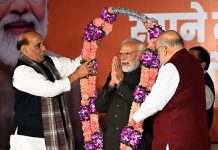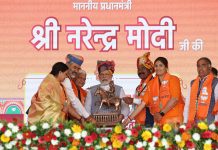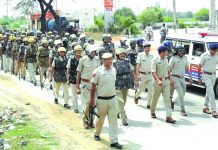 It was the winter of 2003. We were inching to the end of the year. Plans were being made about how to celebrate New Year’s Eve. I insisted that I didn’t want to go to any Indian suburban party and would rather spend it at a happening New York party. Friends obliged and tickets were bought for the NYE party on the ‘Frying Pan’, a boat docked at Pier 66 on the Hudson River which is at West 26th street. Through the evening we danced to music belted out by DJs of many ethnicities, each playing very different music. Then about half an hour before the ball dropped, the most prestigious slot for DJs, there was a change in DJs and I found myself dancing to familiar music — Punjabi Bhangra and Bollywood, being spun by DJ Rekha. DJ Rekha pioneered merging Bhangra and Bollywood sounds with contemporary electronic dance music. That very moment I wanted to interview her to record her extraordinary journey. But I had to wait thirteen years before I got the chance. This column is based on the interview I conducted earlier this year.
It was the winter of 2003. We were inching to the end of the year. Plans were being made about how to celebrate New Year’s Eve. I insisted that I didn’t want to go to any Indian suburban party and would rather spend it at a happening New York party. Friends obliged and tickets were bought for the NYE party on the ‘Frying Pan’, a boat docked at Pier 66 on the Hudson River which is at West 26th street. Through the evening we danced to music belted out by DJs of many ethnicities, each playing very different music. Then about half an hour before the ball dropped, the most prestigious slot for DJs, there was a change in DJs and I found myself dancing to familiar music — Punjabi Bhangra and Bollywood, being spun by DJ Rekha. DJ Rekha pioneered merging Bhangra and Bollywood sounds with contemporary electronic dance music. That very moment I wanted to interview her to record her extraordinary journey. But I had to wait thirteen years before I got the chance. This column is based on the interview I conducted earlier this year.
Rooted in hip-hop and dub, her DJ sets range from Brazilian Baile Funk to Balkan Beats and everything in between. Her debut album ‘DJ Rekha presents Basement Bhangra’, released on E1 Music, features a track with three time Grammy winner and one time Haitian President hopeful Wycelf Jean. It has won much critical acclaim, and was nominated for the best DJ album by the 2008 Plug Awards. She is the founder of the trademarked Basement Bhangra, Bollywood Disco and co founder of Mutiny Club nights. She was named “Ambassador of Bhangra” by the New York Times. Rekha was the sound designer for the TONY award winning Broadway Show ‘Bridge and Tunnel’ and received a Drama Desk Award nomination for her work on the play ‘Rafta Rafta’ and was the associate producer for the NPR Radio Documentary ‘A Feet in Two Worlds.’ She has done remixes for artists that range from Meredith Monk to Priyanka Chopra. She has curated events for Celebrate Brooklyn, Central Park Summerstage and has performed at the White House and internationally. In January this year she was one of the official DJs for the historic Women’s March on Washington. That is a lot of achievement and we haven’t even begun counting the awards.
Rekha Malhotra was born in UK, spent her first year of life in London and the next three in India, but came of age in the Queens and Long Island boroughs on New York City. She grew up listening to Bollywood film music, like most other Diasporic Indian families. When she was eleven years old, her mother gave her a CD of Malkit Singh in which he sang his chart buster hit ‘Tutak Tutak Tutiyaan’. “Why hadn’t I heard such music before?” was the question in Rekha’s mind as she and her cousins began to lap up the music of Singh and Bally Sagoo. They decided to share this Punjabi Bhangra music with the larger community and offered to DJ for them. Before they knew it, the cousins were in business, “having scraped our nickels to buy the player and acquire a suitable library, mostly of music coming from UK,” recalls Rekha of the early years.
In 1997, she set up the iconic monthly party Basement Bhangra for which she began spinning at the Sounds of Brazil, where it stayed for fifteen years before shifting to a new venue and returning this year, growing every year in popularity. What helped her was the fact that “the Bhangra culture had begun capturing the imagination of youngsters across races, through the initial success of the ‘Bhangra Blowout’ which emerged on the George Washington University campus and preceded basement Bhangra by two years”, acknowledges Rekha. But what her Basement Bhangra party gave to all ‘desis’ was a regular weekly place to hang out and build community, and memories that still light up their lives.
More subtly it was a political statement. “The dance floor is a safe and open space. It has no place for xenophobia, racism or Islamophobia. We do not believe in walls. Music transcends boundaries, barriers and bans. Even Bhangra is bigger than the nations that claim it. It is flowering in the Diaspora so I actually have a hard time with the idea Nation. I am recognised as a Punjabi, and that goes beyond nations, in the Diaspora. But we have multiple identities, and we go with what’s comfortable” says Rekha in a rather impassioned manner, recalling to mind Black feminist poet Audre Lorde’s words — “…we do not lead single issue lives”. Rekha is well aware of the fact that the DJ culture comes out of the Black culture which is always being appropriated. “In this resistance with rhythms, I am indebted to Hip Hop culture. It is sacred to me. When I spin Punjabi music I know I am standing on far more ancient ground,” admits Rekha, not ever wanting to be accused of appropriation.
Among the proudest moments in her life are the three times she was invited to the Obama White House, the time she finally met and performed with her childhood idol Malkit Singh in 2011, and when she opened for the AR Rahman concert in Washington DC in 2015. Rekha has received numerous community awards and in 2009 was inducted into the New York City’s Peoples’ Hall of Fame, and was a Grand Marshall of the 9th Annual NYC Dance Parade in 2015.
Rekha recognises that today’s America is in need of conversations and critical lenses. She feels that people like her are the bridges that can make these conversations happen, at least in her community. America, in her opinion, changed with 9/11. She remembers that day as starting off as an unremarkable day although the night before there had been a Michael Jackson concert at Madison Square Garden. That month, September was the beginning of fall, their party barely ten days after the event went ahead. “Although we had no expectation that anyone would show up, thirty people came. They were thirty people who needed that space,” recalls Rekha. “I know I am creating a helpful space,” she acknowledges. It was in this belief that she spun soon after 26/11 in Mumbai and even on the day that her father had a stroke.
Yet after twenty years of scripting a successful South Asian story with her Basement Bhangra parties, in August this year, with one big concert in Central park featuring Apache Indian, Punjabi MC and a lot of emerging talent from North America — from both sides of the border, she closed it down. “They were twenty amazing years no doubt,” she says recognising what she has done for the Diaspora. “When I started the community had slim pickings. It has gone beyond its class consciousness of music and embraced the power of rhythms, irrespective of where they come from. The community is very robust now, generating popular local talent, and I need to follow other creative pursuits,” she says, refusing to detail them at this point. We wait to see what’s next!
letters@tehelka.com












